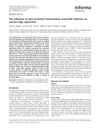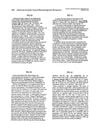Search
for
Sort by
Research
60-90 / 1000+ resultsresearch Efficacy of an Oral Contraceptive Containing EE 0.03 mg and CMA 2 mg (Belara) in Moderate Acne Resolution: A Randomized, Double-Blind, Placebo-Controlled Phase III Trial
The oral contraceptive with ethinyl estradiol and chlormadinone acetate is effective in treating moderate acne.

research Long-Term Safety and Efficacy of Mirabegron and Solifenacin in Combination Compared with Monotherapy in Patients with Overactive Bladder: SYNERGY II Study
Using mirabegron and solifenacin together is safe and more effective for treating overactive bladder than using either drug alone.

research The Effect of Metformin on Hirsutism in Polycystic Ovary Syndrome
Metformin improves hair growth and menstrual frequency in women with PCOS and hirsutism.

research Effect of Acupressure on Health-Related Quality of Life in Patients with Polycystic Ovarian Syndrome: A Randomized Clinical Trial
Acupressure improves quality of life in PCOS patients.
research 5-Alpha-Reductase Inhibitor Treatment for Frontal Fibrosing Alopecia: An Evidence-Based Treatment Update
5-alpha-reductase inhibitors may help stabilize or slow down hair loss in some frontal fibrosing alopecia patients, but more research is needed to confirm their effectiveness and safety.

research Combined Drug Triads for Synergistic Neuroprotection in Retinal Degeneration
Using three different drugs together may better treat eye diseases like glaucoma and macular degeneration.

research Photobiomodulation in Cells' Repair
Photobiomodulation helps reduce pain, lessen inflammation, heal wounds, and can be used in skin treatments. It also boosts hair growth in women with hair loss and may help fight microbes and prevent respiratory issues in COVID-19.

research Standardization of Plasma Rich in Growth Factors and Its Effects on Androgenic Hair Loss
PRGF treatments increased hair number and thickness in people with hair loss, with more injections leading to better results.

research Efficacy and Safety of a Low-Level Laser Device in the Treatment of Male and Female Pattern Hair Loss: A Multicenter, Randomized, Sham Device-Controlled, Double-Blind Study
Laser device increases hair density, safe for treating hair loss in men and women.
research Comparison of a New 5% Minoxidil Foam and Rogaine in the Treatment of Androgenetic Alopecia in Chinese Men: A Randomized, Double-Blind, Phase III, Equivalence Trial
The new 5% minoxidil foam is as effective and safe as Rogaine® for treating hair loss in Chinese men.

research Efficacy of Topical Combination of 0.25% Finasteride and 3% Minoxidil Versus 3% Minoxidil Solution in Female Pattern Hair Loss: A Randomized, Double-Blind, Controlled Study
Combination of 0.25% finasteride and 3% minoxidil works better than just 3% minoxidil for increasing hair thickness in women.

research Efficacy and Safety of Minoxidil 5% Foam in Combination With a Botanical Hair Solution in Men With Androgenic Alopecia
Using Minoxidil 5% foam with a botanical hair solution twice daily can significantly improve hair growth and appearance in men with hair loss, and is generally well-tolerated.

research Efficacy and Safety of Minoxidil 2% Solution in Combination With a Botanical Hair Solution in Women With Female Pattern Hair Loss/Androgenic Alopecia
Using Minoxidil 2% solution with a botanical hair solution twice daily can significantly improve hair growth and quality in women with Female Pattern Hair Loss, boosting self-confidence and attractiveness.

research The Influence of Peri-Incisional Triamcinolone Acetonide Injection on Wound Edge Apposition
Injecting triamcinolone acetonide near surgical cuts doesn't greatly affect wound healing but may help in areas with less tension.

research Faculty Opinions Recommendation of a Randomized, Active- and Placebo-Controlled Study of the Efficacy and Safety of Different Doses of Dutasteride Versus Placebo and Finasteride in the Treatment of Male Subjects With Androgenetic Alopecia
Dutasteride 0.5mg was found to be more effective than finasteride 1mg in treating male pattern hair loss, with similar side effects.

research In Other Journals: Summaries of Dermatological Studies from 2011
Cellulite may be linked to low adiponectin, isotretinoin with UVB can treat psoriasis effectively, permanent alopecia post-chemotherapy resembles a unique hair loss, deodorants may cause fragrance allergies, desmoplastic melanoma is becoming more common, and intensive UVB treatment can give long-term psoriasis remission.
research Topical Medication Instillation Techniques for Glaucoma
There is not enough evidence to know if different ways of putting in eye drops for glaucoma work better than others.

research Hemodynamic Effects of Minoxidil Following Intravenous Infusions in Untreated Hypertensive Patients
Minoxidil given intravenously caused small changes in diastolic blood pressure and increased heart rate at higher concentrations in patients with high blood pressure.

research Platelet Rich Plasma Combination Therapies for Treatment of Androgenetic Alopecia: A Systematic Review
Combining platelet-rich plasma with other treatments may improve hair growth in people with hair loss, but more research is needed.

research Promotion of Homology-Directed DNA Repair by Polyamines
Polyamines help fix DNA damage accurately in cells.

research Baricitinib for the Treatment of Alopecia Areata
Baricitinib helps regrow hair in adults with severe alopecia better than a placebo and is approved for treatment, but long-term effects are still unknown.
research Faculty Opinions Recommendation of a Randomized, Active- and Placebo-Controlled Study of the Efficacy and Safety of Different Doses of Dutasteride Versus Placebo and Finasteride in the Treatment of Male Subjects with Androgenetic Alopecia

research WS PRO 160 I 120 mg (A Combination of Sabal and Urtica Extract) in Patients with LUTS Related to BPH
WS PRO 160 I 120 mg effectively treats urinary symptoms from BPH with good safety and tolerability.
research The Nominal Trial: Clinical Efficacy, Cosmetic Acceptability, and Local Tolerability of Topical 5% Minoxidil Lotion Without Propylene Glycol: A 6-Month, Multicentre, Real-Life, Prospective, Assessor-Blinded Study in 196 Subjects With Hair Loss
The 5% minoxidil lotion without propylene glycol is effective, well-tolerated, and cosmetically acceptable for hair loss.

research Short-Acting Intramuscular Testosterone Delivered in the Clinic Setting Remains a Key Patient-Friendly and Patient-Directed Option in the Contemporary Management of Hypogonadism
Short-acting testosterone injections in a clinic are a preferred treatment for low testosterone because they work well, are convenient, and patients stick with the treatment.

research Bimatoprost Versus Mometasone Furoate in the Treatment of Scalp Alopecia Areata: A Pilot Study
Bimatoprost was found to be safer and more effective than mometasone furoate for treating scalp hair loss.

research Abstracts
Finasteride significantly increases scalp hair and prevents hair loss in young and middle-aged men.

research Therapeutic Efficacy of a Combination Therapy of Topical 17α-Estradiol and Topical Minoxidil on Female Pattern Hair Loss: A Noncomparative, Retrospective Evaluation
Combination of 17α-estradiol and minoxidil improves hair growth and reduces hair loss in most patients.

research The Effect of Finasteride on the Risk of Acute Urinary Retention and the Need for Surgical Treatment Among Men with Benign Prostatic Hyperplasia
Finasteride reduces urinary issues and surgery need in men with enlarged prostates by over 50%.